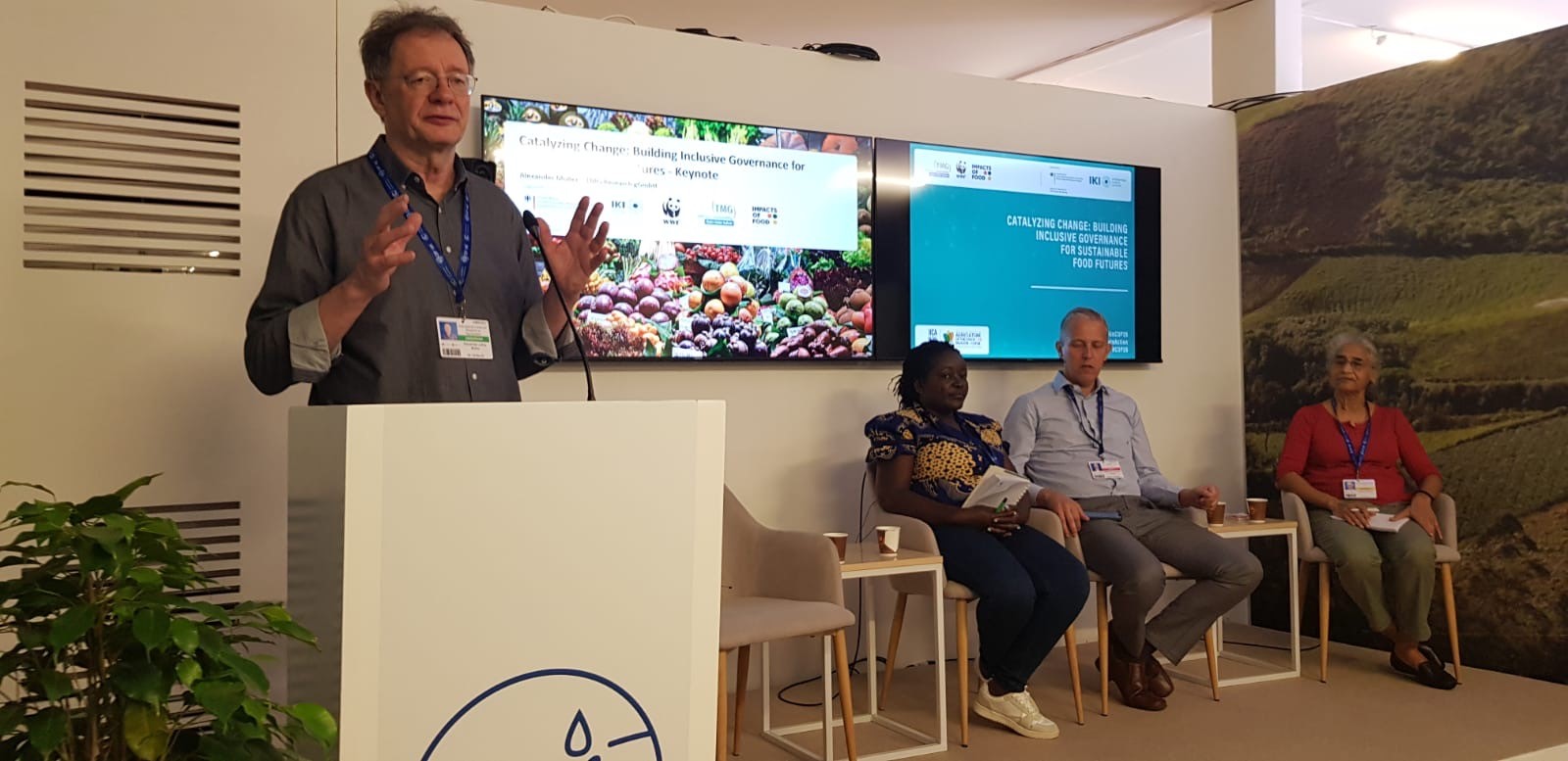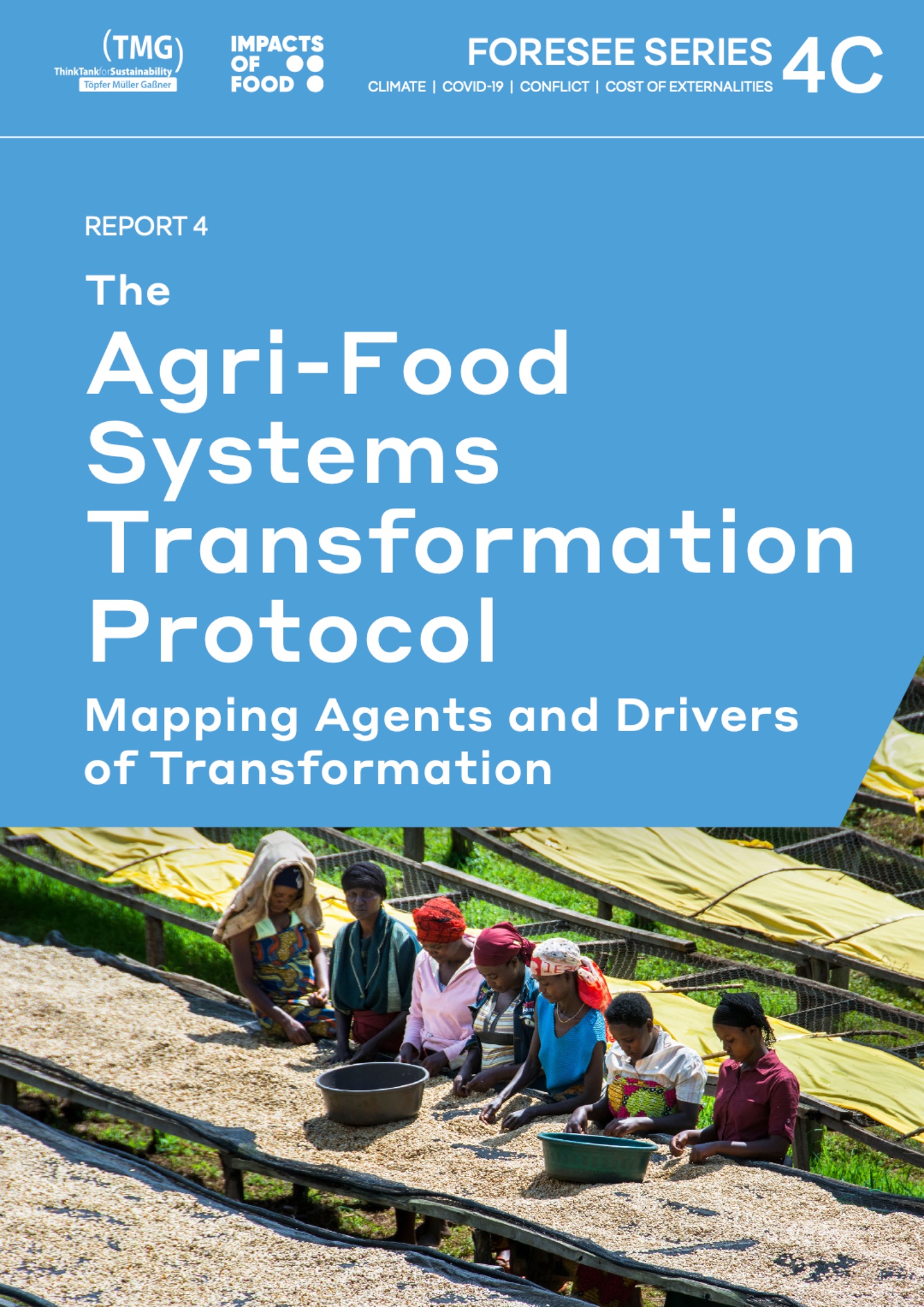Insights from UNFCCC COP28 Side Events: Creating Inclusive Governance Solutions for Sustainable Food Systems
Two side events by TMG Research and WWF discussed how to get from declarations to implementation of effective food systems transformation.
by Lisa Maria Klaus | 2023-12-19

Numerous conferences highlight aspects of the transformation of our food systems, but recommendations often lack specific steps for implementation. At UNFCCC COP28 two side events by TMG Research and WWF sought to fill this gap and discussed the questions of who needs to transform what, at which level, and how to navigate effective governance for food systems transformation.
Towards a multilevel-governance framework
Alexander Müller, Managing Director of TMG Research, stressed the importance of a multilevel-governance framework for food systems transformation. He called for a shift from declarations to concrete actions and presented the ‘Agri-Food Systems Transformation Protocol’ – a concise decision support tool for developing transformation pathways. The protocol was developed by TMG Research together with a group of scientists and published in their latest report. Alexander Müller further pointed out that the current global food system benefits specific stakeholders, citing the substantial gains made by food commodity traders in 2023 despite the multiple crises that we face. He called for a new governance system with inclusive decision-making mechanisms to achieve the transformation and for creating alliances with like-minded actors from different sectors to work towards this goal.
Speakers emphasized the need to translate global goals into local actions
During the first panel discussion in the IICA Pavilion on 5 December, Marcella D’Szousa, Director of the WOTR Centre for Resilience Studies in India highlighted the importance of focusing on outcomes and involving communities in governance at the local level. Rosinah Mbenya, Country Coordinator of PELUM Kenya emphasized the centrality of smallholder farmers in solving the problems of our food systems and advocated for stakeholder platforms and national agroecology policies. Alessandro Cruvinel, Director of Innovation at the Ministry of Agriculture and Livestock in Brazil, highlighted Brazil's efforts in implementing low-carbon agriculture plans over the past decade and stressed the importance of governance, technology, and innovation. Trade, agricultural subsidies, and land tenure were identified as critical aspects needing more attention. Louise Baker, Managing Director of the Global Mechanism, UN Convention to Combat Desertification (UNCCD) advocated for collaboration at the landscape level, involving various government departments and technology transfer.

Alexander Müller presenting his keynote at UNFCCC COP 28.
In conclusion, Martina Fleckenstein, Global Policy Director, Food, WWF International, emphasized the need for institutional innovation and a multilevel governance system for food systems transformation. She called for the debate to continue at the COPs of the three Rio Conventions in 2024.
Discussions highlighted the complexities of governance and the diverse paths toward building inclusive and sustainable food systems
During the second panel discussion on 10 December in the WWF Pavilion, Rafael Arantes, Extraordinary Secretariat for Combating Poverty and Hunger, Brazil shared insights into CONSEA, Brazil's national council on food security and nutrition. Despite challenges, Rafael Arantes recommended replicating this model, citing its success in amplifying the voices of underrepresented groups. Nicole Pita, International Panel of Expert on Sustainable Food Systems (IPES-Food) raised concerns about the influence of transnational corporations on global food system governance. She highlighted IPES-Food's report on corporate interests in decision-making, emphasizing the need to democratize decision-making spaces. Wei Zhang, International Food Policy Research Institute (IFPRI) discussed successful governance mechanisms at the local level, drawing on the ‘living lab for people’ approach, part of the CGIAR Research Initiative on Low-Emission Food Systems. Manuel Jaramillo, Director General, Fundación Vida Silvestre Argentina, referred to governance efforts in Argentina, giving the example of the roundtable for sustainable beef and emphasized the importance of addressing power imbalances and transparency in stakeholder collaborations.
Fleckenstein concluded the event by expressing hope for the integration of food systems into the Global Stock take’s outcomes and a strong message on food system transformation in the COP's final decision. As we know today, these expectations were not sufficiently fulfilled. Overall, the panel discussion explored avenues to construct inclusive and sustainable food systems, considering power imbalances and strategies to overcome them.
TMG will continue its work on the governance of food systems and launch another report in 2024, focusing on the linkages between sustainable production and consumption. Follow our work here.
 Urban Food FuturesFeb 09, 2026
Urban Food FuturesFeb 09, 2026Pushing the horizon: Urban farming and community-led innovation in Mukuru informal settlement
A small community-run greenhouse in Mukuru is offering insights into how controlled-environment agriculture can strengthen food security in urban environments under increasing pressure—and a look into the future of food systems in informal settlements.
Christian Sonntag, Emmanuel Atamba, Lumi Youm
 Land GovernanceDec 18, 2025
Land GovernanceDec 18, 2025Land tenure, women’s land rights, and resilience: Reflections from CRIC23 toward UNCCD COP17
Our experts discuss what the exchanges at CRIC23 highlighted and revealed about the role of secure and gender-equitable land tenure in the UNCCD's work ahead of the 2026 triple COP year.
Frederike Klümper, Washe Kazungu
 Urban Food FuturesDec 09, 2025
Urban Food FuturesDec 09, 2025The story of Mukuru's Urban Nutrition Hub
In Mukuru informal settlement, a safe haven for women has grown into the Urban Nutrition Hub, a multi-purpose space for nutrition education, training, and community development, demonstrating the potential of grassroots community-owned innovation..
Serah Kiragu-Wissler



